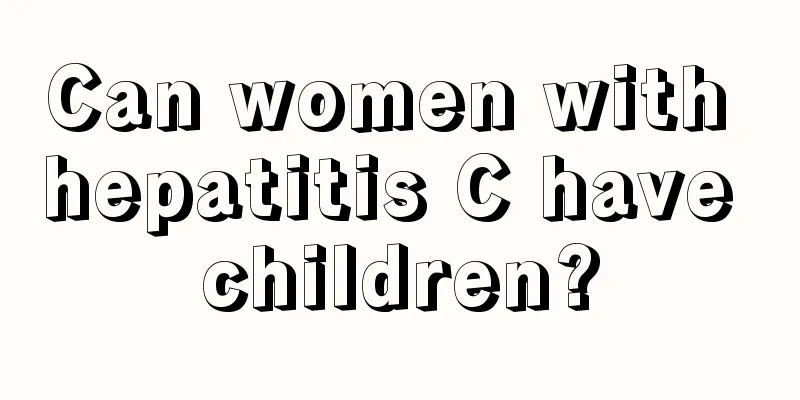Can women with hepatitis C have children?

|
Hepatitis C is a type of viral hepatitis. Like hepatitis B, hepatitis C is contagious. Many women are concerned about whether patients with hepatitis C can have children. It is possible to have children with hepatitis C, but it will affect the fetus. In this case, it is generally recommended to receive treatment first and then prepare for pregnancy. 1. Women with hepatitis C can have children, but because taking medication after pregnancy can have a serious impact on the fetus, it is recommended to receive treatment first and then consider pregnancy and childbirth. If a woman has hepatitis C, the hepatitis C virus will reside in her body for a long time, causing a certain degree of damage to the liver. Pregnancy itself will also increase the burden on the liver. In addition, she must be very cautious about taking medications during pregnancy. If a woman becomes pregnant when her condition is unstable, it will be extremely detrimental to her condition and liver. 2. Hepatitis C, like hepatitis B, is an infectious disease, one of which is mother-to-child transmission. It can also be transmitted through blood and sex. It is not a genetic disease. The chance of mother-to-child transmission of hepatitis C is low. If the hepatitis C RNA test is negative, it means that you are in a stable state and you can consider pregnancy. However, if the test result is anti-HCV positive, it is recommended to become pregnant and have a baby after hepatitis C is cured, which will be better for the health of both the mother and the baby. Regardless of your hepatitis C status, it is recommended that you get treatment first before getting pregnant. 3. If a woman with hepatitis C gives birth to a child, it is very likely that the hepatitis C virus will be transmitted to her offspring, affecting the health of the newborn. People with hepatitis C can have children, but for the sake of their offspring and their own health, it is best for hepatitis C patients to receive treatment before considering having children. If a mother with hepatitis C wants to know whether her newborn is infected with the hepatitis C virus, she can test the child for hepatitis C antibodies and hepatitis C virus load six months after the child is born. If both the antibodies and the virus load are positive, it most likely means that the child born to the mother with hepatitis C is infected with hepatitis C, otherwise, the child is not infected with the hepatitis C virus. |
<<: What causes irregular menstruation after sexual intercourse?
>>: What should I do if I catch a wind-heat cold during breastfeeding?
Recommend
What are the symptoms of premenopause in women?
After women enter menopause, they are at the age ...
This is the principle of scraping. I just found out about it today!
Gua Sha is a common natural therapy in Traditiona...
What causes leucorrhea with blood after menstruation?
Women secrete a liquid in their vagina, which is ...
What is the difference between the Mercedes-Benz A-Class and C-Class? Introduction to Mercedes-Benz automatic transmission gears
Mercedes-Benz C-Class is the most popular model i...
What to do if your breasts are not firm
Breasts are the secondary sexual organs of women,...
What are the nutrients and benefits of shiitake mushrooms? Can shiitake mushrooms be fried directly?
Shiitake mushrooms can be cooked with a variety o...
What kind of mattress is good for the humid south? How to clean a dirty mattress?
As people pay more attention to health, they have...
Hysteroscopy pregnancy rate
In order to get pregnant, the woman's own egg...
What is the cause of bleeding during intercourse on the fifth day of menstruation?
What happens if I bleed during intercourse on the...
What to do if your heart beats too fast in late pregnancy
In the late stages of pregnancy, the fetus is alm...
Is cervical papillary a benign tumor?
Cervical papillary is actually a benign tumor, bu...
Can girls grow taller by playing basketball?
Nowadays, the issue of height in life is also a b...
How many days is normal for menstrual cycle
Women's menstrual cycle, also known as menstr...
Picture of baby in five months of pregnancy
Ten months of pregnancy is hard work. The emotion...
What is the Good-for-Nothing Dreamer based on? Where can I read the Good-for-Nothing Dreamer novel?
The movie The Good-for-Nothing Dreamer, starring ...









